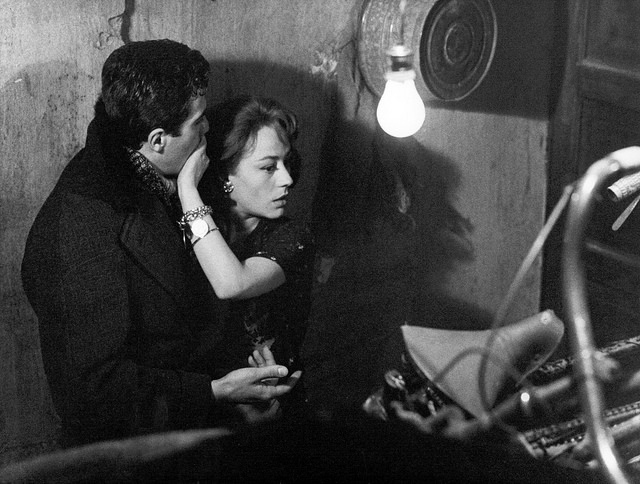





Director: Luchino Visconti | Cast: Alain Delon, Annie Girardot, Renato Salvatori, Katina Paxinou, Claudia Cardinale, Spiras Focas, Max Cartier | Italy 1960, 180’
After La Terra Trema (1948), Visconti returned to neo-realism and films exploring the cultural divide between the classic North and South of Italy. This theme feature featured, twelve years later, in his operatic length feature: Rocco e i suoi fratelli: an acerbic criticism of Italian social reality, “where the split between South and North was never so harsh, the prejudice of the North never so never fundamental, even though it was the era of the Italian economic miracle”.
Based on works by Giovanni Verga, Antonio Gramsci and Carlo Levi (Cristo si e fermato a Eboli), Visconti asked a team of writers to develop a script which would show “that people from the South who moved to the North for economic reasons would never be treated like brothers, but as strangers and intruders and would be forced to do the dirty work”.
As usual with Visconti, the original script team was dismissed and the task was given to Suso Cecchi d’Amico, Visconti’s regular writer. Her story was the basis of Rocco, and she collaborated with Visconti to finesse the final narrative.
Evan today, the split between the two geographical parts of Italy is still very much alive with the right-wing political party, “Lega Nord”, fights to maintain the divide between North and The Meridione.
Before shooting began Visconti fell out with his regular producer Franco Christaldi who refused to cast Annie Girardot; instead, for reasons of box-office, suggesting Brigitte Bardot or Pascale Petit – “just fit to be engaged as manicurists”- according to Visconti. So in the end Goffredo Lombardo of ‘Titanus’ took over the production, after having reluctantly agreed to cast Girardot.
The film opens with Rosaria Parondi (Paxinou) arriving in Milan with her three grown-up sons Rocco (Delon), Simone (Salvatori), Ciro (Cartier) and their kid brother Luca, they meet the in-laws of their oldest brother Vincenzo (Focas), who is engaged to Ginetta (Cardinale).
Vincenzo has integrated well into Northern society but his newly arrived family is viewed with suspicion by the Ginette’s Milanese family. Vincenzo, a successful boxer, secures fights for his brothers Rocco and Simone, but cannot do anything about the harsh living conditions his newly arrived family encounters.
Rosaria, a tough and dominant matriarch, soon solves this problem and the family moves into one of the high rise blocks on the outskirts of Milan. Simone falls in love with one of their neighbours, a prostitute called Nadia, and he starts to neglect his boxing, coming off badly in a fight. Rocco, on the other hand, takes his responsibilities seriously, even though he hates boxing, and does much better than Simone, who is a street fighter by nature.
Tragedy ensues and Visconti deduced to shoot the now famous murder scene in Milan’s ‘Idrobasa’, but the city council refused him permission, accusing Visconti disloyalty to the city of his birth. Finally, the scene was shot near lake Fogliano, near Lattina. (in real life, Salvatori married Giradout, and the couple had a daughter).
After winning the Grand Jury Prix at Venice in 1960, Rocco was censored and could not be shown at all in certain parts of Italy. Visconti replied with a long letter to the Italian Minister of Culture, accusing him of “wanting to repress the showing of the film altogether – only the media, the public and the Left-wing parties have made it possible to screen the censored version”.
DOP Giuseppe Rotunno’s wide screen black-and-white images of the desolate suburb the Parondis are the some of the most impressive portraits of Italian neo-realism. His fighting scenes in the ring are equally outstanding, never shrinking away from the brutality of this “sport”, particularly when featuring Rocco, who hates violence and uses the fights to punish himself.
Delon is the fallen angel. Not sure of his gender orientation, he compensates by taking on responsibility for his family; trying to make up for Simone’s crimes, he even goes back to the ring for good in the end. In the end Salvatori is the coward, masquerading as a bully. When the police come after him he hides, begging for his mother. Girardout’s Nadia is very much in the ‘Carmen’ mould, sensuous and so full of life, a victim of male brutality. Rotunno would go on to shoot The Leopard for Visconti. But Rocco remains one of Italy’s finest films, full of intensity and rich complexity; like the Italians themselves. AS
https://youtu.be/kK1WXnyEkBk?feature=shared
Luchino Visconti: Decadence & Decay Visconti and his Cinema: Decadence & Decay Season Launch
Visconti and his Cinema: Decadence & Decay Season Launch | A season introduction event exploring the themes emerging in the work of Luchino Visconti.
Thursday 09 January 2025 18:10 at the BFI London SE1